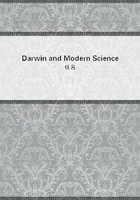
第169章
(See "More Letters", I. page 424.) He tells us, "I was led to anticipate that the species of the larger genera in each country would oftener present varieties, than the species of the smaller genera." ("Origin", page 44.)He argues "where, if we may use the expression, the manufactory of species has been active, we ought generally to find the manufactory still in action." (Ibid. page 45.) This proved to be the case. But the labour imposed upon him in the study was immense. He tabulated local floras "belting the whole northern hemisphere" ("More Letters", I. page 107.), besides voluminous works such as De Candolle's "Prodromus". The results scarcely fill a couple of pages. This is a good illustration of the enormous pains which he took to base any statement on a secure foundation of evidence, and for this the world, till the publication of his letters, could not do him justice. He was a great admirer of Herbert Spencer, whose "prodigality of original thought" astonished him. "But," he says, "the reflection constantly recurred to me that each suggestion, to be of real value to service, would require years of work." (Ibid. II. page 235.)At last the ground was cleared and we are led to the final conclusion. "If the difficulties be not insuperable in admitting that in the long course of time all the individuals of the same species belonging to the same genus, have proceeded from some one source; then all the grand leading facts of geographical distribution are explicable on the theory of migration, together with subsequent modification and the multiplication of new forms."("Origin", page 360.) In this single sentence Darwin has stated a theory which, as his son F. Darwin has said with justice, has "revolutionized botanical geography." ("The Botanical Work of Darwin", "Ann. Bot." 1899, page xi.) It explains how physical barriers separate and form botanical regions; how allied species become concentrated in the same areas; how, under similar physical conditions, plants may be essentially dissimilar, showing that descent and not the surroundings is the controlling factor;how insular floras have acquired their peculiarities; in short how the most various and apparently uncorrelated problems fall easily and inevitably into line.
The argument from plant distribution was in fact irresistible. A proof, if one were wanted, was the immediate conversion of what Hooker called "the stern keen intellect" ("More Letters", I. page 134.) of Bentham, by general consent the leading botanical systematist at the time. It is a striking historical fact that a paper of his own had been set down for reading at the Linnean Society on the same day as Darwin's, but had to give way. In this he advocated the fixity of species. He withdrew it after hearing Darwin's. We can hardly realise now the momentous effect on the scientific thought of the day of the announcement of the new theory. Years afterwards (1882) Bentham, notwithstanding his habitual restraint, could not write of it without emotion. "I was forced, however reluctantly, to give up my long-cherished convictions, the results of much labour and study." The revelation came without preparation. Darwin, he wrote, "never made any communications to me in relation to his views and labours." But, he adds, I...fully adopted his theories and conclusions, notwithstanding the severe pain and disappointment they at first occasioned me." ("Life and Letters", II. page 294.) Scientific history can have few incidents more worthy. Ido not know what is most striking in the story, the pathos or the moral dignity of Bentham's attitude.
Darwin necessarily restricted himself in the "Origin" to establishing the general principles which would account for the facts of distribution, as a part of his larger argument, without attempting to illustrate them in particular cases. This he appears to have contemplated doing in a separate work. But writing to Hooker in 1868 he said:--"I shall to the day of my death keep up my full interest in Geographical Distribution, but I doubt whether I shall ever have strength to come in any fuller detail than in the "Origin" to this grand subject." ("More Letters", II. page 7.) This must be always a matter for regret. But we may gather some indication of his later speculations from the letters, the careful publication of which by F.
Darwin has rendered a service to science, the value of which it is difficult to exaggerate. They admit us to the workshop, where we see a great theory, as it were, in the making. The later ideas that they contain were not it is true public property at the time. But they were communicated to the leading biologists of the day and indirectly have had a large influence.